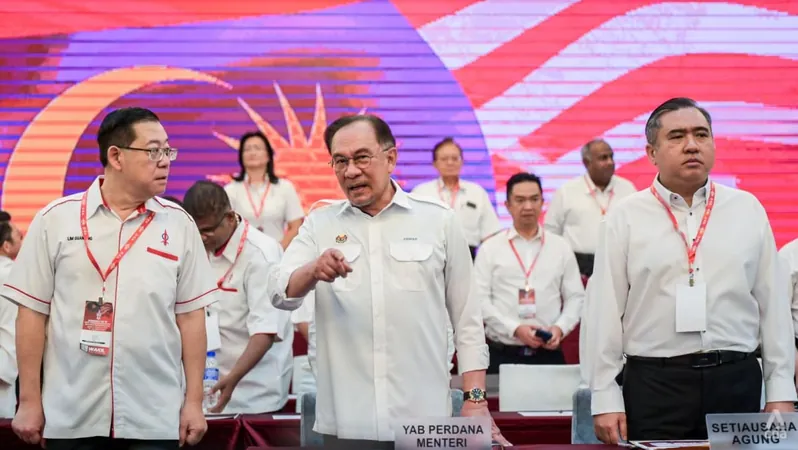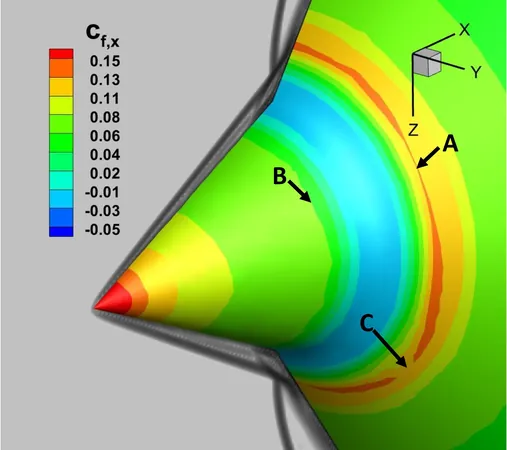
Tension and Unity: DAP Leaders Navigate Party Elections Amid Anwar's Government Scrutiny
2025-03-16
Author: Jia
SHAH ALAM: As the Democratic Action Party (DAP) gears up for pivotal party elections this Sunday (March 16), two of its prominent leaders, Chairman Lim Guan Eng and Secretary-General Anthony Loke, have expressed their strong support for Prime Minister Anwar Ibrahim but emphasize the necessity of voicing critique on key issues.
During DAP's national congress held prior to the elections, both leaders affirmed their commitment to Anwar’s leadership while asserting that the party must remain vocal on matters affecting the nation. Lim, who played a vital role in Anwar's rise to the premiership, declared, "DAP refuses to be a 'yes-man party'—our loyalty is to the voters and the Malaysian people."
Loke highlighted the balance between supporting the government and holding it accountable, assuring that DAP's leaders will continue to advocate for citizens while finding respectful and constructive ways to do so.
The congress also featured Anwar and leaders from other parties within the ruling Pakatan Harapan (PH) coalition. This year's DAP congress is particularly notable as it involves the election of a Central Executive Committee (CEC), entrusted with the party's key decision-making.
With Lim Guan Eng representing the party's established leadership and Anthony Loke signaling the emergence of younger voices, the elections reflect a deeper trend. In recent months, younger DAP leaders have voiced their desire for increased influence amid allegations of political favoritism within the party's ranks.
Many view Lim's outspoken criticisms as necessary; he has previously challenged issues like government policies on education and the quality of public contracts. At the congress, he reiterated the need for enhanced support for businesses impacted by foreign tariffs, urging the government to prioritize economic reforms.
On the other hand, Loke addressed past critiques about DAP leaders allegedly withholding their opinions since joining the government. He countered this perception, sharing his private discussions with Anwar concerning important legislative matters, including a recent proposal regarding citizenship for abandoned children, which was ultimately withdrawn.
The DAP is now focusing on governance, adapting its approach now that it is part of the ruling coalition. Loke explained the importance of strategic communication with Anwar, framing it as essential for productive collaboration within the government. He also stressed the significance of proposing policies to limit a prime minister's term to a decade—a reform that Anwar has openly supported.
While internal party dynamics are under scrutiny, the upcoming DAP elections are critical, especially given that party unity is essential for Anwar, who must balance the interests of multiple factions within his diverse coalition government. With DAP holding 40 parliamentary seats—second only to the PAS—and a significant presence in state assemblies, its internal cohesion could either bolster or challenge Anwar's administration.
Political analysts anticipate that any divisions within the DAP could pose challenges for Anwar, who has been navigating the complexities of leadership since taking office in November 2022. With expectations high for the performance of a party viewed as predominantly Chinese but intentionally multi-racial, DAP’s direction following this congress will be crucial not just for its future but for Malaysia’s political landscape as a whole.



 Brasil (PT)
Brasil (PT)
 Canada (EN)
Canada (EN)
 Chile (ES)
Chile (ES)
 Česko (CS)
Česko (CS)
 대한민국 (KO)
대한민국 (KO)
 España (ES)
España (ES)
 France (FR)
France (FR)
 Hong Kong (EN)
Hong Kong (EN)
 Italia (IT)
Italia (IT)
 日本 (JA)
日本 (JA)
 Magyarország (HU)
Magyarország (HU)
 Norge (NO)
Norge (NO)
 Polska (PL)
Polska (PL)
 Schweiz (DE)
Schweiz (DE)
 Singapore (EN)
Singapore (EN)
 Sverige (SV)
Sverige (SV)
 Suomi (FI)
Suomi (FI)
 Türkiye (TR)
Türkiye (TR)
 الإمارات العربية المتحدة (AR)
الإمارات العربية المتحدة (AR)